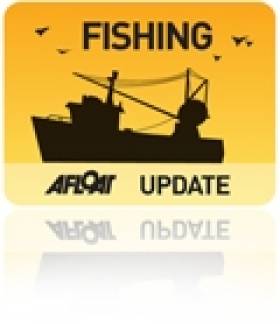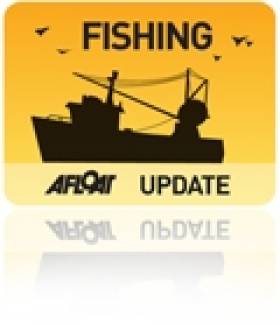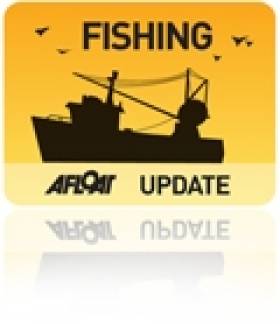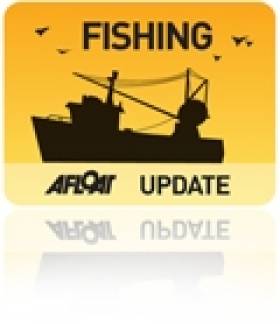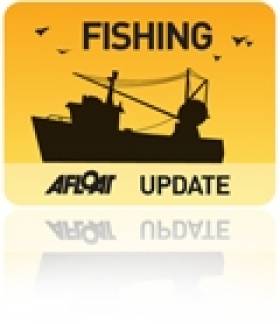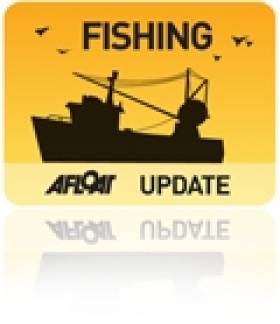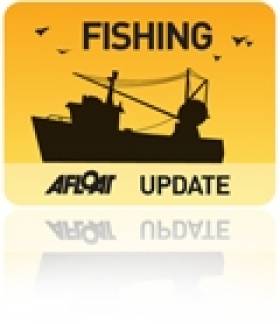Displaying items by tag: CFP
#Fishing - Marine Minister Simon Coveney will present a revised comprehensive compromise Irish EU presidency text to the EU Council of Fisheries Ministers on Monday 13 May seeking a new mandate to re-enter final negotiations with the European Parliament on a reformed Common Fisheries Policy (CFP).
Minister Coveney said that these decisive negotiations for agreeing a comprehensive reform of the CFP in Brussels on 13-14 May are likely to be very difficult given the significance for the next decade of what may be decided at the meeting.
“An enormous amount of work has gone into progressing the reform with council, commission and parliament during the Irish presidency," he said. "We now have an Irish presidency substantially revised set of compromise proposals which I believe give us a sound basis for positive engagement at council.
"Agreement at council on this presidency compromise package would support an ambitious reformed CFP which would secure a better future for our fish stocks and for the fishermen and coastal communities who depend on them."
The minister emphasised that there is a "very short window of opportunity for council and parliament to agree and deliver an effective reform of our fisheries policy and the Irish presidency is doing all it can to bring the institutions together to take this historic opportunity.
"I believe that if all parties focus on the critical elements of a reformed CFP, we can by working together reach realistic and substantial agreement through the co-decision process during the Irish presidency.”
Formal negotiations with the European Parliament have resulted in the Irish presidency drawing up a revised compromise 200-page legal text, which Minister Coveney, as president of the council, will use as the basis of negotiations with EU fisheries ministers.
The objective is to get political agreement on a final compromise package to enable conclusion of negotiations with the parliament and the commission on CFP reform during the Irish presidency, which concludes at the end of June.
Minister Coveney will also update EU ministerial colleagues on progress made to date by the Irish presidency during the ‘trilogue’ process where EU presidency (council), commission and parliament have been engaged in complex discussions on refining proposals for CFP reform.
Clonakilty EU Meet Agrees on CFP Reform by End of June
#fisheries – The Minister for Agriculture, Food and the Marine Simon Coveney TD has welcomed the commitment by Director Generals for Fisheries of EU Member States (meeting at the National Seafood Centre, Clonakility on Tuesday 16th April) to achieve agreement on CFP reform by the end of June. The meeting, hosted by the Irish Presidency, assessed progress on the Reform proposal to date and explored options for brokering resolutions by EU Ministers and Parliament. While there is agreement between the Council and the Parliament on the policy objectives for the Reform, there remain significant outstanding issues on the detailed implementation arrangements. Directors General from 23 EU Member States, together with a delegation from the European Commission attended the meeting.
The Minister stated "I am encouraged by the fact that the key EU Member States with an interest in fisheries policy were represented at the Clonakilty meeting. This indicates the serious desire by all parties involved to make reform of Europe's Common Fisheries Policy a reality. Significant progress has already been made during our Presidency on advancing the CFP Reform process and we are now entering a critical stage of the process when we can expect things to become even more challenging".
The Irish Presidency has prioritised securing an agreed Reform of the CFP by the end of June. This will necessitate all three EU institutions involved (Council of Ministers, EU Parliament and the EU Commission) agreeing on a final way forward.
The Minister Continued "Bringing together the most senior officials of the key Fisheries Member States at this delicate stage is another important step in preparing the groundwork for EU Ministers and Parliament to agree a final deal before the end of June. I have always believed that the Irish Presidency offers the best opportunity to secure agreement on a significant and lasting Reform of the CFP."
The current CFP reform proposals aim to bring fish stocks back to sustainable levels by setting fishing opportunities based on scientific advice to deliver maximum sustainable yields, eliminate discards on a phased basis and bring renewed prosperity to the fisheries sector by creating opportunities for economic growth in coastal areas.
The Minister added "The time is now right for a radical and lasting reform of the CFP. I intend to work with all parties involved during the remaining months of our Presidency to secure that crucial final agreement. Significant challenges remain and we anticipate an intense work programme in the weeks and months ahead if we are to achieve our ambition of brokering an agreed CFP reform package. The robust and proactive discussion at Tuesday's meeting of senior officials will make an important contribution to this process and prepares the way for the Ministerial discussion on the Reform in the EU Fisheries Council of Ministers next Monday in Luxembourg".
Groups Urge Fisheries Ministers For Action On CFP
#CFPreform - RTÉ News reports that up to 200 conservation groups in Ireland and abroad have written to Marine Minister Simon Coveney and his EU counterparts urging his support for an end to overfishing in European waters by 2015.
The groups claim that mismanagement of EU fisheries under the Common Fisheries Policy has resulted in significant overfishing, particularly in the Mediterranean where as much as 80% of fish stocks are fished far beyond sustainable levels.
As previously reported on Afloat.ie, Minister Coveney - who is President of the European Council of Fisheries Ministers - welcomed a vote in February on a reform agenda for the CFP, which has been prioritised for delivery by the Irish EU presidency before the six-month term concludes at the end of June.
Ending Fish Discards Requires New Technologies - Damanaki
#Fishing - Key to proposals to end fish discards in this year's reform of the Common Fisheries Policy (CFP) is the introduction of new technology like wheelhouse cameras and 'smart nets'.
So argues EU Fisheries Commissioner Maria Damanaki, as BBC News reports on trials of new net designs that can separate fish catches and reduce damage to the seabed.
One of the fishing net innovations involves a bendable plastic grid attached to the middle of a trawl net that allows smaller fish and juveniles to pass through while snaring the valuable larger catch.
Another design, the Rollerball net, attempts to eliminate the problem of heavy trawling gear churning up debris on the sea floor while reducing drag and saving on boats' fuel bills.
Assuaging concerns over the prohibitive costs for fishermen, Damanaki says she hopes that such 'smart nets' will be subsidised by as much as 85% - while emphasising that the adoption of new technology could mean the difference between being allowed to fish or being banned from the ocean.
Wheelhouse CCTV cameras are another method that has been shown to reduce discards to less than 1% in some cases - and Damanaki says they will be essential if the CFP reforms indeed include a zero tolerance policy on fish discards.
BBC News has much more on the story HERE.
Coveney Seeks Agreement From EU Marine Ministers On Discards Ban
#Fishing - Minister for the Marine Simon Coveney will be seeking agreement from his European colleagues at next week’s Fisheries Council on how when and how introduce an effective discards ban in the context of the reform of the Common Fisheries Policy (CFP).
At the June 2012 Fisheries Council, ministers did not reach agreement on how a discard ban would be implemented or when such a ban would be introduced.
The challenge for Minister Coveney as president of the European Council of Fisheries Ministers is to secure wide agreement at council on an ambitious early date for the introduction of a ban in all waters across the EU from the Baltic & North Sea to the North Eastern Atlantic, the Mediteranean and the Black Sea.
Ministers will need to agree the practical measures that will ensure that the ban is capable of being effectively implemented in all these areas.
In a review of global discarding, the Food and Agriculture Organisation of the United Nations (FAO) noted that the North East Atlantic has the highest discard level in the world, estimated at 1.3 million tonnes, the majority attributed to EU fisheries. The EU Commission itself estimates that 23% of all fish caught by EU vessels are discarded.
Discarding occurs in almost every fishery, in every area and across most fleets in the European Union. Every member state operating fishing operations on the open sea has a discard problem. Many member states have significant levels of discards in certain fisheries, and for varying reasons.
The policy to stop discarding of fish and to change behaviour of fishermen so that unwanted by-catches and juvenile fish are no longer caught must be seen as an integral part of fisheries management in general and serve the overarching goals of moving to long-term management based on ecosystem considerations and reaching maximum sustainable yield by 2015, where possible, and by 2020 at the latest for all stocks.
The three European institutions, all member states and importantly the Irish presidency are fully supportive and committed to the introduction of a discard ban.
A very important element of delivering the overall objective will be the introduction across all fisheries of smarter and more selective fishing gear, strengthened selectivity measures and changed fishing practices that avoid to the greatest extent possible unwanted catches particularly those of juvenile fish.
To assist the debate on discards and facilitate actions to resolve the problem, Ireland published a 'Discards Atlas' detailing the full extent of discards by the Irish whitefish fleet. It is critically important that other member states do likewise to support the introduction of the new policy and inform measures that will be needed to ensure that a new policy is fully implemented by EU fishing fleets.
Minister Coveney commented: "I am and continue to be a strong advocate for a policy which eliminates the wasteful practice of discards.”
On the prospects for council, he said: “I am under no illusion of the challenges the effective implementation of a discards policy pose for European fishermen and for the member states of the EU, and will work intensively with my European ministerial colleagues over the course of the February Council to deliver a policy with an ambitious timetable for implementation that will end the discarding of fish and support the rebuilding of fish stocks and the future of coastal communities depending on fishing.
"It is my firm belief that the success or failure of the reformed CFP will be judged to a large extent on the effectiveness of whatever discard ban is introduced and that there is widespread support for the ban from the fishing nations of the EU and their fishermen.
"It is imperative that European fisheries ministers collectively take this progressive but challenging decision now and co-operate in agreeing appropriate and effective measures to eliminate discards with ambitious timelines."
Agreement in the council will free up the Irish presidency, on behalf of the council, to begin negotiations with the European Parliament and Commission to reach political agreement on a new reformed Common Fisheries Policy by June.
Marine Minister Welcomes Vote on Common Fisheries Policy Reform
#CFPReform - Minister for the Marine Simon Coveney, in his capacity as President of the European Council of Fisheries Ministers, last week welcomed the vote by the European Parliament on the reform agenda for the Common Fisheries Policy (CFP) which has been prioritised for delivery by the Irish EU presidency.
The vote, which is seen a major step forward in the CFP reform process, follows the minister’s address to parliament on Tuesday last. At the address the minister appealed for all parties to work together towards an agreed CFP reform package to be delivered during the period of Ireland’s presidency.
These reforms, which prioritise long term sustainability of fishing stocks, elimination of the controversial practice of discards (dumping at sea) and a switch to long-term (scientifically based) planning for fisheries, were approved by the parliament on Wednesday 6 February.
The decision of the parliament follows the minister’s address last Tuesday during which he identified the reforms as a major priority on the Irish Government’s EU presidency agenda.
Minister Coveney stated: “I am delighted that the parliament has today decided to back these necessary and timely reforms to the Common Fisheries Policy and that the case for reform outlined in my recent address has been accepted in an agreed manner.
"I am particularly encouraged that this vote has occurred during the Irish EU Presidency. This shows the pivotal role which Ireland can play in influencing broader European Policy and in bringing together divergent views towards an agreed reform package for the CFP.
"Ireland has set out an ambitious work programme aimed at delivering an agreed reform package for the CFP by the end of June. This objective can only be realised if [European] Parliament, Council and the Commission work together focusing on the bigger picture of an agreed reform agenda to benefit all of Europe’s citizens.”
During his address to the plenary session of European parliamentarians, Minister Coveney expressed his view that a momentum was now gathering behind the drive to deliver an agreed reformed CFP package by the end of June.
Acknowledging to the parliament that he had set out an ambitious work programme for his presidency, the minister accepted that differences remain between the European Council and Parliament, particularly on the question of multi-annual fisheries plans.
Minister Coveney emphasised the significant areas of common ground between both institutions and his belief that this would eventually lead to an agreed way forward on most aspects of the reform package. He stressed that it was only in a framework of mutual cooperation and flexibility that the objective of a reformed CFP which prioritises long term fisheries sustainability could be delivered in the lifetime of the current Irish Presidency.
The minister acknowledged the challenges ahead and emphasised the importance for the EU Parliament, Council and Commission to work together on all the issues including delivering on maximum sustainable yield, the elimination of discards and regionalisation.
Following an exchange of views, the minister sought support for his objective of achieving political agreement by the end of June in addition to acceptance of the need for a different and more effective way of working to deliver on what is a commonly held objective. He committed to working constructively with the parliament on all outstanding issues.
Important Fisheries Talks Continue in Brussels
#Fishing - Important talks on EU fisheries reform are continuing in Brussels after progress in Clonakilty recently, according to RTÉ News.
As previously reported on Afloat.ie, Marine Minister Simon Coveney welcomed a deal signed on Friday 18 January between the EU and Norway on allowable catches and quotas.
The agreement was seen as a positive move at the end of a week of talks at the National Seafood Centre, which followed a number of false starts due to difficulties in balancing mutual access and management arrangements.
Minister Coveney said that meetings taking place in Brussels today (28 January) are "about setting the scene for six months of intensive work" to produce dossiers for both the Common Fisheries Policy and the Common Agricultural Policy, for which he hopes definitive reforms can be achieved by this summer.
Both the CFP and CAP account for 40% of the European Union budget.
EU Votes For Changes To Common Fisheries Policy
#FISHING - Minister for the Marine Simon Coveney has welcomed today's vote in the European Parliament to make amendments to the Common Fisheries Policy (CFP), as RTÉ News reports.
The vote comes just weeks before Ireland assumes its six-month EU Presidency term in January - and has been described by MEP Pat 'the Cope' Gallagher as significant step towards tacking the problem of discards in a practical manner.
Earlier this year Europe's fisheries ministers hailed a "breakthrough" deal on ending the practice of discards, whereby countless numbers of fish are thrown back into the sea under the quota system implemented by the CFP.
However, environmental groups criticised the timeline for implementation of the discards ban, as well as the "vague" wording of the proposed limits on fishermen.
Meanwhile, Minister Coveney was last month accused of "hypocrisy" by environmental groups for his support of fishing fleet subsidies that they argue would be used by bigger fishing countries like France and Spain to exploit dwindling stocks in Irish waters.
Markus Knigge, a consultant with environmental lobby group Ocean 2012, said Minister Coveney's position on the matter was a U-turn on his previous commitment to end the practice of discarding fish at sea.
The EU Fisheries Council, which runs from today till Thursday 20 December, will among other issues see quotas for the Irish fishing fleet decided for 2013.
Ireland is facing severe double-digit cuts in almost 30 different fish stocks considered vital to the Irish fishing industry.
The minister has described the negotiations as the "most difficult" in years.
Coveney to Focus on Future of Coastal Communities
The meeting focused on the key areas of importance to both countries in the Common Fisheries Policy. Minister Coveney said "I consider that the Reform of the CFP to be absolutely crucial to the future of the Irish fishing industry and I am committed to working to deliver a reform package that works for Irish fishermen and also ensures that fish stocks are rebuilt and are managed in a sustainable way. Coastal communities are directly dependent on a healthy fishing industry and the new CFP must deliver long term economic activity and employment for these communities. My experience to date in public life has reinforced the importance of building trust and a positive relationship with key decision makers. My relationship with the Spanish Minister with responsibility for fisheries is important in that regard. Today was an important first step in that relationship".
Minister Coveney and Minister Rosa Aguilar agreed to focus on key elements of the CFP Reform and to develop a mutual understanding in advance of key negotiations later this year. A joint statement on the areas of mutual interest that were discussed is attached. Minister Coveney said "While there are certain areas where Ireland and Spain have opposing positions, particularly in relation to access to fish stocks, there are many areas where both countries have similar concerns. Both countries have coastal communities very dependent on fishing and related activities and the new CFP must be reformed to work positively in the long term to support these communities".
Minister Coveney added "The development of mutual understanding on core issues including effectively addressing discards, will be critical in the negotiations. I am also convinced that the consumer must be given clear information on the origin and production methods of fish in order to be able to make an informed choice. This approach will, I firmly believe, benefit EU fishermen and aquaculture operators who operate under strict environmental and food safety rules. I am seeking to reform the CFP in the area of governance so that stakeholders are given a key input into management arrangements that are developed on a regional basis. Both Minister Rosa Aguilar and myself are convinced of the importance of increased EU funding to support the reformed CFP.
I will be consulting closely with the Irish fishing industry and other stakeholders over the coming weeks so that I have a full understanding of all the issues. We have the opportunity now to deliver real reforms and I consider that we must work closely with other Member States on areas of mutual interest and importance to develop a policy that ensures that there is a future for Irish fishermen and coastal communities".


























